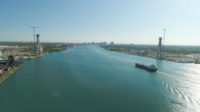Construction of the Gordie Howe International Bridge recently reached a milestone with the mid-span closure connecting the center of the 1.5-mile-long bridge. While work is not yet complete, the connection makes the Howe bridge the longest cable-stayed bridge in North America and 10th longest in the world.
“The connection of the bridge deck underscores our unwavering commitment to building a legacy infrastructure project with the highest standards of quality and safety,” said David Henderson, CEO of joint venture contractor Bridging North America (BNA), in a statement. The JV includes Fluor, ACS Infrastructure Canada and Aecon Group Inc.
BNA started work in 2018 on both sides of the bridge. The contract is worth about $4.8 billion, including 30 years of operation and maintenance by Fluor and ACS as part of a P3 with the owner, the Windsor-Detroit Bridge Authority.
Each side of the bridge has 27 deck segments, which left a 36-ft gap between the two sides. Making the center connection involved a four-week process of placing temporary bents, and installing the steel girders, beams and precast concrete panels before removing the bents.
The Gordie Howe International Bridge is scheduled to open in fall 2025 with a 0.53-mile clear span over the Detroit River between Windsor, Ontario, and Detroit. It will carry six lanes and a multi-use path. Work on the bridge surface is underway, with crews placing 10.62-in.-thick concrete for the approach spans. Once that is finished, they will place a 1.97-in.-thick road surface of latex modified concrete.
Fine-tune re-stressing of the bridge’s 216 stay cables is expected to finish this summer. Crews are also installing electric systems, drainage infrastructure and fire suppression equipment. And next year, the team plans to build a peregrine falcon nesting box below the bridge deck.
The project also includes construction of ports of entry on both sides of the border and an interchange on the U.S. side at Interstate 75 with four road bridges, five pedestrian bridges and four interchange ramps.
 Crews closed the mid-span gap in June. Photo courtesy Windsor-Detroit Bridge Authority
Crews closed the mid-span gap in June. Photo courtesy Windsor-Detroit Bridge Authority“While we celebrate the physical deck connection today, it gives us the opportunity to look to the very near future when we will see truck drivers make their way to deliver their freight to market, commuters heading to work and back home again, and tourists enjoying the views that bond our two countries from the multi-use path,” said Charl van Niekerk, CEO of the bridge authority, in a statement.





